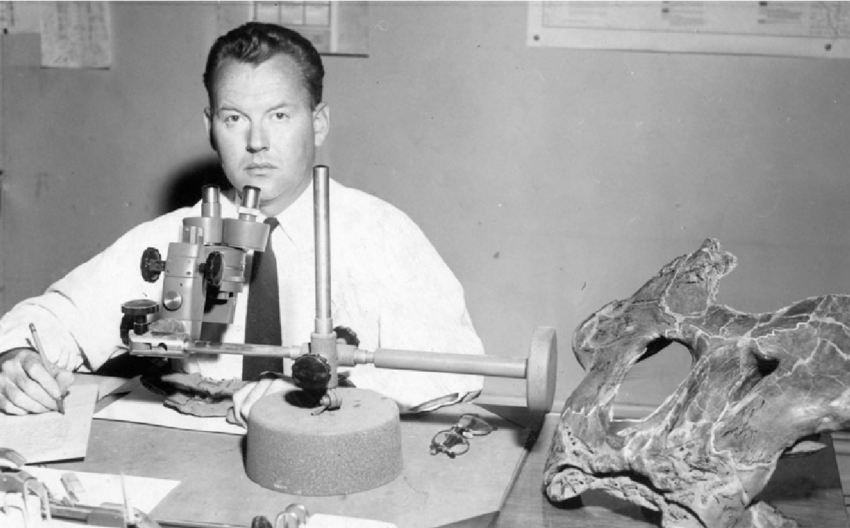
Paleontologist
A career as a paleontologist involves studying the history of life on Earth through the examination of fossils. Paleontologists analyze fossilized remains of plants, animals, and microorganisms to understand their evolution, interactions, and environmental contexts. Their work contributes to our knowledge of prehistoric life and helps in fields such as geology, biology, and anthropology. A career as a paleontologist in India involves rigorous academic training, fieldwork, and research. While the path can be challenging due to competition and funding constraints, it offers the opportunity to contribute significantly to our understanding of prehistoric life and the Earth's history. Aspiring paleontologists can pursue diverse career paths in academia, museums, government agencies, and the private sector, making impactful discoveries and advancing scientific knowledge.
Role Desciption
- Excavation: Conducting field expeditions to dig and extract fossils from sedimentary rocks.
- Surveying: Mapping and surveying potential fossil sites using geological tools and techniques.
- Sample Collection: Collecting fossil samples and geological materials for further analysis.
- Documentation: Recording detailed field notes, photographs, and GPS data of fossil sites and discoveries.
- Fossil Preparation: Cleaning, conserving, and preparing fossils for study and display.
- Identification: Identifying and classifying fossils based on their physical characteristics and taxonomy.
- Dating: Using techniques such as radiometric dating to determine the age of fossils.
- Paleo-environmental Reconstruction: Analyzing sedimentary rocks and fossil assemblages to reconstruct ancient environments and ecosystems.
- Microscopic Analysis: Examining microfossils and conducting histological studies to understand fossil structure and composition.
- Hypothesis Development: Formulating scientific hypotheses about the evolution, behavior, and ecology of ancient organisms.
- Data Analysis: Analyzing fossil data using statistical and computational methods.
- Comparative Studies: Comparing fossil specimens with modern organisms to draw evolutionary relationships.
- Publication: Writing and publishing research papers in scientific journals and presenting findings at conferences.
- Academic Instruction: Teaching undergraduate and graduate courses in paleontology, geology, and related fields.
- Field Training: Supervising and training students and interns during field expeditions.
- Advising: Mentoring graduate students and advising them on their research projects and theses.
- Collection Management: Managing fossil collections in museums and research institutions.
- Exhibit Design: Designing and curating exhibits to educate the public about paleontology and prehistoric life.
- Public Outreach: Conducting workshops, lectures, and tours for museum visitors, schools, and community groups.
- Environmental Consulting: Providing expertise in environmental impact assessments and land use planning.
- Petroleum and Mining Industry: Advising on the geological aspects of resource exploration and extraction.
- Conservation: Working on the conservation and preservation of fossil sites and natural heritage.
- Interdisciplinary Collaboration: Working with geologists, biologists, archaeologists, and climate scientists to conduct comprehensive research.
- Professional Associations: Participating in professional organizations such as the Paleontological Society and attending annual meetings and conferences.
- Science Communication: Writing popular science articles, books, and creating media content to engage the public.
- Advocacy: Advocating for the protection of fossil sites and promoting policies that support scientific research and education.
Eligibility
Educational Route to Become a Paleontologist in India
- 10+2 in Science stream with PCB
- Bachelor of Science (B.Sc.) in Geology or Earth Sciences
- Master of Science (M.Sc.) in Geology, Paleontology, or Earth Sciences
- Ph.D. in Paleontology, Geology, or a related field
Pros/Cons
Pros:
- Scientific Discovery: Opportunity to make significant contributions to our understanding of the Earth's history.
- Fieldwork Adventures: Exciting fieldwork in diverse and often remote locations.
- Academic Fulfillment: Engaging in research, teaching, and continuous learning.
- Interdisciplinary Work: Collaborating with professionals from various scientific fields.
Cons:
- Job Market: Competitive job market with limited positions.
- Fieldwork Challenges: Physical demands and potentially harsh field conditions.
- Funding: Reliance on grants and funding for research projects.
- Travel: Extensive travel may be required for fieldwork and conferences.
Leading Professions
View All
Academic Researcher
Conducting research and ...
8.0LPA

Museum Curator
Managing fossil collecti...
7.0LPA

Field Paleontologist
Conducting excavations a...
8.0LPA

Geologist
Applying paleontological...
10.0LPA

Science Writer/Communicator
Writing articles, books,...
6.0LPA

Conservation Paleontologist
Working on the conservat...
9.0LPA

Consultant
Providing expertise for ...
12.0LPA
CAREER VIDEOS
Career Path
10+2 in Science with PCB/ PCM
1 Steps
Skills
Recruitment Area
Government organizations ,
NGOs ,
Museums ,
Private Practice ,
research agencies ,
universities .
Recruiters
Jawaharlal Nehru University (JNU) ,
Indian Institute of Science (IISc) ,
Banaras Hindu University (BHU) ,
Geological Survey of India (GSI) ,
Indian Museum (Kolkata) ,
Birbal Sahni Institute of Palaeosciences (Lucknow) ,
Wadia Institute of Himalayan Geology ,
Centre for Cellular and Molecular Biology (CCMB) ,
Oil and Natural Gas Corporation (ONGC) .
Explore Colleges
Exams & Tests
Interested? Take the next step for this career
10+2 in Science with PCB/ PCM
- 1 Steps
Skills Needed
Exams and Tests
Recruitment Area
Government organizations ,
NGOs ,
Museums ,
Private Practice ,
research agencies ,
universities .
Recruiters
Jawaharlal Nehru University (JNU) ,
Indian Institute of Science (IISc) ,
Banaras Hindu University (BHU) ,
Geological Survey of India (GSI) ,
Indian Museum (Kolkata) ,
Birbal Sahni Institute of Palaeosciences (Lucknow) ,
Wadia Institute of Himalayan Geology ,
Centre for Cellular and Molecular Biology (CCMB) ,
Oil and Natural Gas Corporation (ONGC) .



















